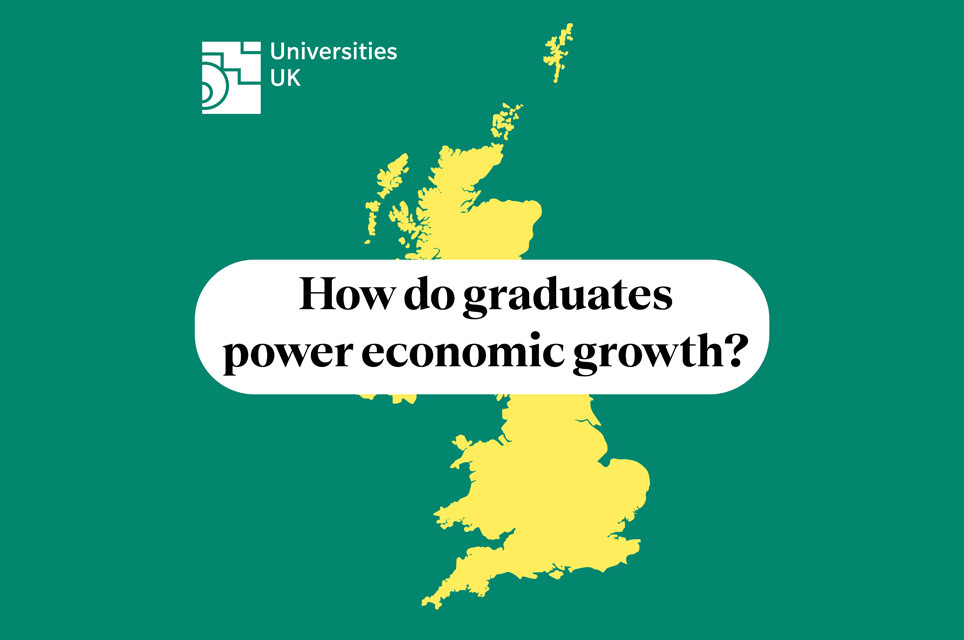New analysis shows that graduates will be key to government’s industrial strategy in the West Midlands

- Recent data has revealed that graduates in the West Midlands account for 50% of the workforce
- Official government forecasts show that between 2025 and 2035 the UK economy will need 1.7 million more workers in occupations associated with graduate skills
- By 2035 the UK economy will require a workforce where 61% hold a higher education qualification compared to 52% in 2025 and 48% in 2020
New data has revealed that university graduates make up 50% of the workforce in the West Midlands and account for a significant proportion of the workforce in key growth sectors highlighted in the government’s industrial strategy.
The analysis, which was conducted by Universities UK (UUK), shows the impact of graduates in the workforce across key growth sectors and the important role they play in driving national and regional growth.
In the West Midlands, five of those vital growth sectors have more than 45% graduates in their workforce.
- Life sciences (59%)
- Creative Industries (64%)
- Digital and Technologies (60%)
- Energy industry (62%)
- Professional and Business services (73%)
Alongside infrastructure and investment, high level skills are key to driving productivity. Government research shows that increased HE participation has played a pivotal role in preventing a decline in productivity. The research revealed that people with postgraduate and first degrees made up 22% of the UK workforce between 2001 and 2007, increasing to almost 35% between 2014 and 2019.
Universities nationwide are actively working with major employers in their regions to provide the workforce needed in key sectors which in turn helps to boost regional and national growth. For example, Keele University is working with partners in the NHS to help to boost skills and education opportunities for people in Shropshire with a suite of new healthcare courses. The new partnership will see Keele and Telford College working together to deliver a range of healthcare courses for Shropshire students, with a particular focus on training a new generation of health and social care workers.
The University also has strong links with businesses which it leverages for promoting economic growth across Staffordshire and beyond. As well as having 60 businesses based on the campus' Science and Innovation Park, many of whom work with Keele students and graduates, the University has also delivered over 2,000 collaborations with local businesses in recent years.
Professor Trevor McMillan OBE, Vice-Chancellor of Keele University, said: “We often focus on the positive impact of university for individuals, and the skills and knowledge they can acquire during their degrees. But what’s just as pertinent is the huge impact that graduates have on the regions where they live and work, both as individuals and collectively. This analysis by Universities UK demonstrates the profoundly positive impact that graduates have in strengthening the economy, and the even greater potential they can unlock for promoting growth, both across the West Midlands and nationally.”
Despite there being a good spread of graduates in the workforce across all regions, UUK’s analysis highlights a stark gap between London and the South East where the proportion of graduates in the workforce is by far the highest, compared to the rest of the UK.
With the government seeking to drive growth across all parts of the UK the data indicates that many regions could continue to lag behind if action is not taken. The data shows that the current gap in high level skills between London and the rest of the UK amounts to 4 million graduates.
In fact, government data shows that by 2035 the UK economy will require a workforce where 61% hold a higher education qualification compared to 52% in 2025 and 48% in 2020, further emphasising why widening access to higher-level skills will be key to supporting the workforce for the future should be a priority for the government.
Vivienne Stern MBE, Chief executive of Universities UK said: “Our analysis shows just how important graduates are to economic growth. Regions where graduates make up the majority of the workforce report the highest levels of productivity while those with lower proportions risk getting left behind.
“High growth sectors identified as priorities by government are hungry for graduate talent. If we can’t supply this, then companies will be held back or may go elsewhere. We have to get serious about making sure the country has the high-level skills the economy needs to stay competitive. Those who say there are too many graduates are plain wrong.
“With universities in every part of the country, from Cornwall to the Highlands and Islands, a sustainably funded university sector can continue to widen access to these higher-level skills and support the workforce for our future economy.”
At a national level, the Creative sector (75%), Professional and business services (73%), Digital sector (72%) and life science sector (70%) are particularly dependent on high levels of graduate skills.
Most read
- Keele-led partnership to lead multi-million pound research initiative to transform mental health support
- New debate series to explore societal challenges affecting universities
- Keele researchers selected for prestigious USA exchange programme
- Keele University launches pioneering green hydrogen generation hub
- Keele celebrates graduation of its first fully qualified paramedics
Contact us
Andy Cain,
Media Relations Manager
+44 1782 733857
Abby Swift,
Senior Communications Officer
+44 1782 734925
Adam Blakeman,
Press Officer
+44 7775 033274
Ashleigh Williams,
Senior Internal Communications Officer
Strategic Communications and Brand news@keele.ac.uk.



